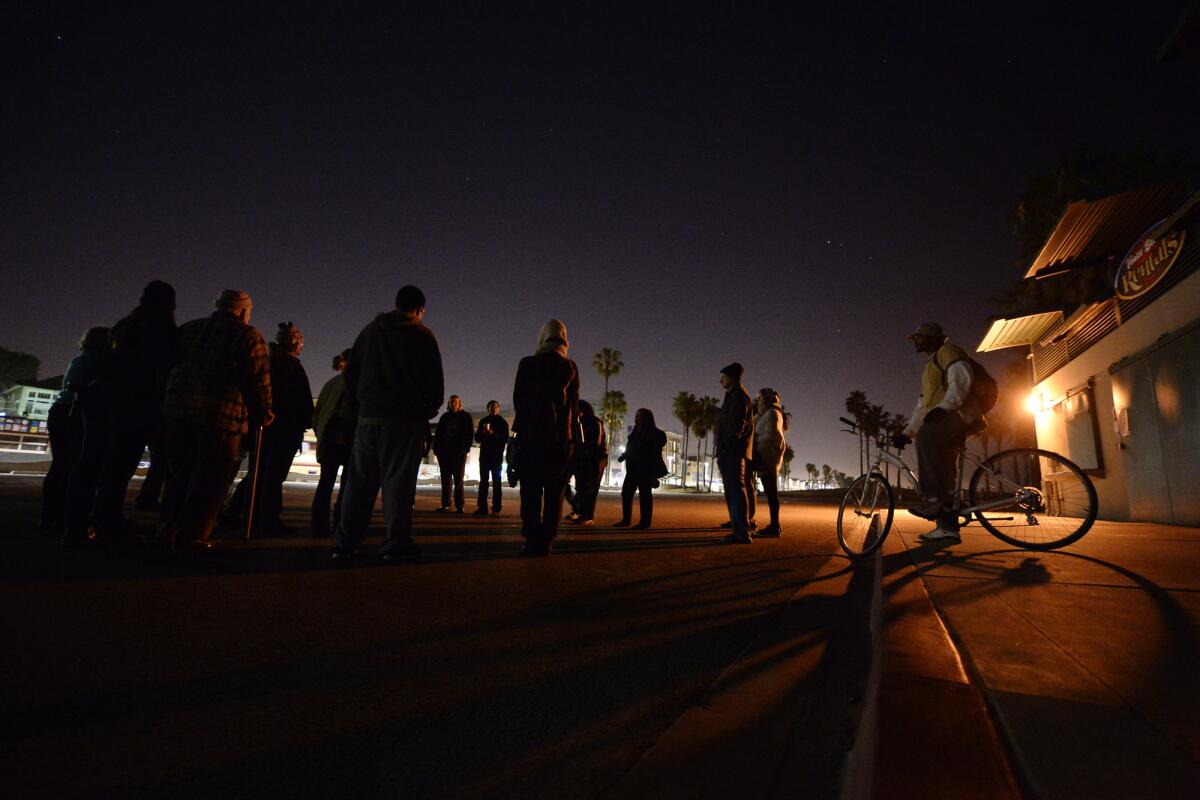Venice activists sue city of Los Angeles over beach curfew

Protesters gathers in April at Venice Beach to challenge the midnight-to-5 a.m. curfew. Venice activists have sued the city seeking to overturn the ban.
- Share via
Citing the right to public commons stretching back to the Roman Empire, Venice activists filed a suit Wednesday to strike down the city of Los Angeles’ 27-year-old overnight beach curfew.
The lawsuit contends that the midnight-to-5-a.m. ban on sleeping, strolling, surfing or fishing on the sands was adopted in defiance of the state Coastal Commission’s sole jurisdiction over the shoreline, and asks the court to issue an injunction to stop enforcement of the measure.
The suit grows out of the ongoing battle over Venice’s rising homeless population and tensions that have arisen as the tech industry makes inroads into the beach enclave’s famously bohemian and inclusive culture.
But the curfew governs the city’s entire 11-mile coastline, including the rocky cliffs of San Pedro’s Point Fermin and the fire pits and RV camping of Dockweiler Beach, a favorite of residents of landlocked and impoverished neighborhoods.
“The beaches are for the public,” said Francesca de la Rosa, a longtime civic activist and a plaintiff in the case. “The city can’t make up their own rules where people are supposed to be.”
City Atty. Mike Feuer and the Coastal Commission declined to comment, saying that they had not seen the suit.
Mark Ryavec, president of the Venice Stakeholders Assn., said lifting the curfew would exacerbate serious crime problems and attract new transients to the community.
“The conditions at Venice Beach are such a nightmare already, they would only be worsened by opening the beach at night,” Ryavec said.
The city enacted the curfew in 1989 when a downtown campground for the homeless shut down, driving scores of the displaced to Venice.
Gang violence also had begun to surge.
Activists said the ban was lightly enforced until five or six years ago, when complaints about Venice’s homeless population mounted. In 2014, the city ticketed 1,265 homeless people and other individuals for sleeping or smoking on Venice Beach or the boardwalk, the lawsuit said.
The ban caught the Coastal Commission’s attention in 2010 during what turned out to be a failed bid to impose overnight parking restrictions to stop homeless people from sleeping near the beach in RVs and trucks.
In a series of letters, the commission said the city must get a permit to maintain the restrictions, and asked for data supporting credible evidence of a continuing public safety threat in the beach communities.
Then-City Atty. Carmen Trutanich in 2011 characterized the commission’s action as “an assault on the principles and practices of our representative government.”
More recently, the city struck a more conciliatory note, saying that it was negotiating a settlement with the commission. Feuer proposed allowing narrow overnight access to some city beaches, but excluded Venice from the easing. The Los Angeles City Council has yet to take up the matter.
Feuer’s spokesman, Rob Wilcox, said the city “remained in active and constructive conversations with the Coastal Commission.” Commission spokeswoman Noaki Schwartz said that there had been discussions, but that the city remained in violation of the Coastal Act.
The lawsuit characterized walking by the waves or star-gazing as a fundamental right.
“An individual’s right to unobstructed access to the ocean, beaches and waterways has been recognized since the ancient laws of the Roman Empire,” the suit said.
The suit also contends that the city is wasting taxpayer money by enforcing the curfew law and seeks fees for plaintiffs’ counsel, the Legal Aid Foundation of Los Angeles and the law firm Sheppard Mullin.
The city has paid millions of dollars in attorney fees and costs in recent years after losing legal challenges to its homeless enforcement policies.
Twitter: @geholland
ALSO
L.A. County supervisors vote to welcome Syrian refugees
Police seek witnesses in fatal stabbing of homeless man featured in Times story
Berkeley High School ‘takes back’ Dec. 9 after message threatened public lynching
More to Read
Sign up for Essential California
The most important California stories and recommendations in your inbox every morning.
You may occasionally receive promotional content from the Los Angeles Times.











